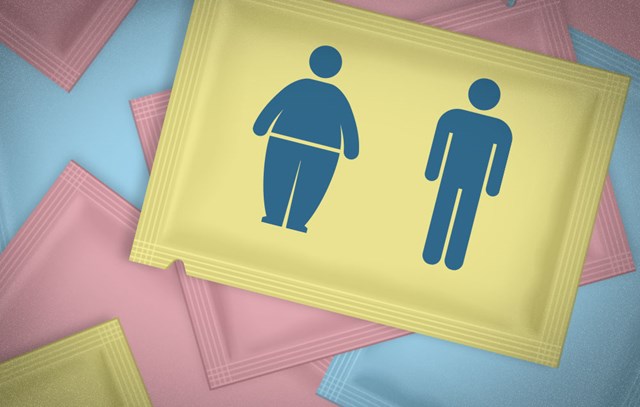
Can that little pink or yellow packet really be the key to your weight-loss goals?
For years, science has been split on whether low- or no-kilojoule sweeteners like Equal or Stevia are actually helping or hindering dropping fat. Sub them in for sugary drinks and you definitely create a kilojoule deficit – the crux of weight loss.
Here’s the truth on the sweet stuff.
Why Artificial Sweeteners May Help You Lose Weight
On a purely mathematical level, the results make sense, says nutritionist Jim White, a spokesperson for the US Academy of Nutrition and Dietetics. Replacing sugary kilojoules with something reduced-kilojoule or kilojoule-free – be it soft drink, coffee drinks or dessert – creates a kilojoule deficit that leads to weight loss.
If you’re overweight or obese, this can have clear health benefits. Shedding kilos can reduce your risk of diseases like type 2 diabetes and heart disease, says White.
How Artificial Sweeteners May Mess With Your Metabolism
But questions remain about whether the guilt-free sweetness may be messing with your body.
For instance, most artificial sweeteners taste far sweeter than sugar – up to 1000 times sweeter, in fact. This has led some experts to question whether these super-sweet tastes may boost cravings for sugar in the long term, says Kelley Bradshaw, a dietitian in the Centre for Endocrinology, Nutrition and Weight Management at Boston Medical Centre.
Evolutionarily speaking, a sugary taste signalled to our brains that we were about to consume a high-energy food, says Dr Yanina Pepino, a researcher at Washington University School of Medicine. So, our bodies produced a hormonal response to prepare.
When the kilojoules don’t come through, we might feel less satisfied, stoking our appetite and leading us to search for more substantial food.
Some evidence from mouse studies supports the idea that eating low-kilojoule substitutes now means bingeing on sugary treats later. More research is needed to see if it occurs in humans too, Pepino says.
However, the human studies that have been conducted so far do raise red flags. For instance, in one study, Pepino had obese adults drink either a glass of water or a glass of liquid sweetened with sucralose before consuming a drink with straight-up sugar.
When the study participants drank sucralose first, their blood sugar shot up higher after the glucose than it did when they started with water. They also needed more insulin to process the same amounts of sugar – a condition called insulin resistance, which can lead to pre-diabetes or full-blown type 2 diabetes.
Pepino isn’t sure what’s responsible for that super spike. She suspects these sweeteners may act on taste receptors outside the mouth, like ones along our gastrointestinal tract, throwing off the systems our bodies use to keep blood sugar under control.
Any of these changes might alter our risk for metabolic diseases like type 2 diabetes and weight gain, Pepino says.
What Artificial Sweeteners Mean For Your Long-Term Health
The gold standard for this kind of research is randomised controlled trials, where one group of people is assigned to consume sugar and the other group artificial sweeteners.
But it’s hard to maintain this kind of study over the long-term: in the meta-analysis, the longest experiment analysed lasted about three years.
So we don’t know for sure what happens to your metabolism if you stick to the sweeteners for years or decades, says Pepino.
However, at this time, there is no data to suggest that, with normal consumption, there would be any health issues with this kind of long term consumption, says nutrition expert Dr Mike Roussell.
Still, there has been controversy about the safety of these sweeteners over the years.
Back in the Seventies, scientists linked the sweetener saccharin with the development of bladder cancer in rats. But later research in humans showed the relationship only applied to rodents, and the US Government removed the substance from its list of potential carcinogens in 2000.
More recently, a 2016 study carried out by the Ramazzini Institute in Italy claimed to have found evidence of an association between sucralose and leukaemia in rats.
That finding goes against the 110 safety studies reviewed by the US Food and Drug Administration when approving the sweetener for human use. So experts believe more research in humans need to be done before worrying about possible harm to people.
In fact, toxicity studies have found few adverse effects – besides the potential for an upset stomach – with even large doses of sugar substitutes, White says.
Current evidence suggests adults can safely consume up to 17 cans of soft drink containing aspartame or eight and a half packets of saccharin a day without risking cancer or other serious consequences, according to the Academy of Nutrition and Dietetics.
So Should You Use Artificial Sweeteners to Lose Weight?
Roussell believes that using artificial sweeteners is an effective strategy for reducing added sugar in your diet, which helps with weight loss. And the Academy of Nutrition and Dietetics’s official position holds that sugar substitutes can help you lose weight too.
Bradshaw agrees – but says she’d prefer people use them as a short-term way to wean themselves off added sugar.
That’s because the types of foods that contain either sugar or artificial sweeteners – soft drinks, sweets, biscuits, sweetened coffee drinks – have few nutrients.
Loading up on things that don’t contain added sugars, like fruits, vegetables and whole grains, instead is probably the best long-term weight-loss strategy, she says.
So start by replacing any foods or beverages you’re consuming now that contain added sugar with zero- or low-kilojoule alternatives, Roussell advises. Then move on to unsweetened versions entirely.
But start slow. Give yourself anywhere from a few months to a year to do this; eventually, your taste buds will adjust to less-sweet flavours, Bradshaw says.
You might lose weight more slowly this way than if you quit cold turkey or switched all your sugary foods to sugar-free versions, but her experience suggests you’ll be more likely to keep it off.













